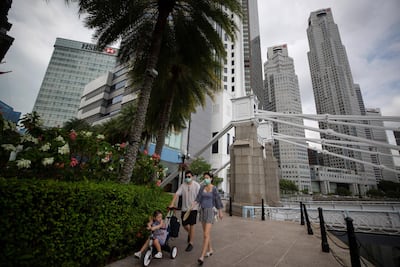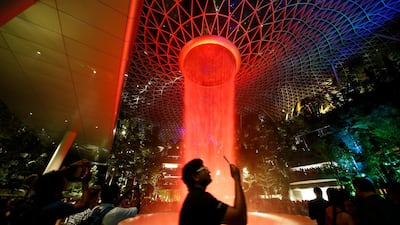After several false starts, travel from the UAE to Singapore has finally reopened.
From Friday, the island state is welcoming tourists from the Emirates, as well as from Saudi Arabia and Qatar as long as they are fully vaccinated.
Singapore has imposed tough measures to try to control the spread of Covid-19 and has been cautious in its reopening.
Travellers can only visit the Asian hub for tourism purposes via its Vaccinated Travel Lane or VTL scheme, and that is only applicable to a few select destinations.
In November, the country delayed plans to extend this scheme to the UAE, Saudi Arabia and Qatar, citing the Omicron variant of Covid-19 as the reason. But from Friday, UAE travellers can finally fly to Singapore for a holiday.
If you are planning a visit, here’s what you need to know.
Who can travel to Singapore?

Vaccinated travellers from listed countries can fly to Singapore for tourism. The Vaccinated Travel Lane currently includes 28 destinations, with the UAE, Qatar and Saudi Arabia the latest destinations to be added, alongside Hong Kong.
Travellers need to apply for entry before they go to Singapore, to be accepted on flights. Applications can be done via this portal.
Singapore citizens and those with residency or other long-term visas don’t need to apply to travel to the country under the VTL.
Applicants must have only travelled to or transited via countries or regions approved in the VTL programme, or to Hong Kong, Macau, China, Taiwan or Singapore in the seven days before arriving in the country. Tourists who have travelled anywhere else in the same time frame won't be approved to fly.
You can see all the countries that are part of VTL here. On Friday, March 4, Israel and the Philippines are expected to be added to the list.
What do I need to do before I fly to Singapore?

As well as applying to VTL, being fully vaccinated and having a negative PCR test result, travellers need to download Singapore's TraceTogether Covid-19 tracking app.
Travel insurance is another must-have. The country insists that all tourists purchase a policy with a minimum coverage of S$30,000 ($22,000) against Covid-19 related medical charges.
If you need a visa to fly to Singapore, you’ll have to apply for the insurance to be approved for travel.
What vaccines does Singapore accept for travel?
Travellers must be fully vaccinated with an immunisation that's approved by Singapore authorities. This currently includes 18 vaccinations, and the full list is available here. Sinopharm is accepted, but if it's been more than six months since your second jab, you'll need to have had a booster.
The last vaccination must have been received at least two weeks before arriving in Singapore and travellers will need to show proof of their vaccination certificate via Al Hosn app, inclusive of a QR code.
Do children need to be vaccinated to travel to Singapore?

Unvaccinated children aged 12 and under can fly to Singapore with their vaccinated parents using VTL. Children do not need to apply for a separate travel pass when entering the country.
I'm vaccinated. Do I need a PCR test to travel to Singapore?
All travellers aged 2 and over will need a negative PCR test or rapid antigen test to fly to Singapore under VTL rules. The test must be taken within 48 hours of flying and should be carried out by an approved laboratory. Emirates has a list of recommended clinics listed on its website.
Will I need to quarantine in Singapore?
Travellers flying to Singapore under the VTL programme do not need to quarantine after landing in the Lion City.
Will I need to take more tests in Singapore?
After landing at Changi airport, travellers have 24 hours to take a rapid antigen test. This must be done at a dedicated testing centre in Singapore and will be at the travellers' own expense. It costs $15 and can only be paid by card at the time of the test.
No more follow-up tests are required as long as the result is negative.
Which airlines are flying to Singapore from the UAE?

Emirates and Etihad fly to Singapore from the UAE. The airlines are operating dedicated VTL flights, which means travellers need to be vaccinated to be accepted for boarding, unless they have an exemption.
From Dubai, Emirates' fares for the seven-and-a-half-hour flights are from Dh1,975 and from Abu Dhabi, Etihad’s economy fares are from Dh1,945.
What can I see and do in Singapore?

Home to awe-inspiring architecture and attractions such as the Marina Bay Sands hotel, Gardens by the Bay and Jewel at Changi airport, Singapore is a modern island destination that has something for everyone.
Embrace the arts with a visit to the National Gallery Singapore and Gillman Barracks or indulge in retail therapy on Orchard Road, which is packed with department stores, boutiques and mega malls.
For nature — visit the Singapore Botanic Gardens or head for the beaches at Sentosa Island. Wherever you go, embrace the island’s melting pot of cultures via ancient temples and teahouses, hawker centres and Chinatown.
What is the best time to visit Singapore?

With year-round hot and humid weather, you can realistically visit Singapore any time of year.
However, February to April is the driest season — and a time when the country has the least amount of rain, the lowest humidity, and the most sunshine.















